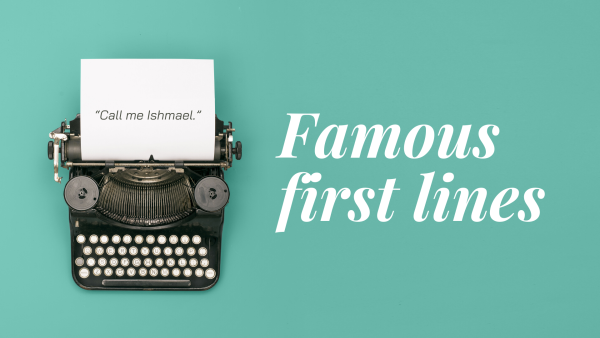
Famous Opening Lines of Classic Books
We have forever been warned to not judge a book by its cover. And so, we merrily go about making our picks based on blurbs, the author's past works, and through recommendations from fellow bibliophiles. Occasionally we might get influenced by the book's marketing frenzy, and maybe sometimes, when no one is looking, even buy one that has a pretty cover.
But what about those famous first lines of books? Words and sentences that, weirdly, carry the weight of the entire novel, its chapter, its characters, and the plot.
Take Moby Dick for instance. When it comes to famous first lines of novels, nothing can be as simple, yet complicated at the same time. A book about a colossal whale starts with a small sentence that comprises of only three words, "Call me Ishmael." As readers, we get to decipher this opening sentence in several ways. For a few, the words create a sense of mystery, leaving us wondering if Ishmael is this person's real name. Then there is the apparent Biblical connotation. While at the same time, we know that the novel will be told in the first person. However, it is also a line that could have no subtext at all and means precisely what it says.
When we talk about famous first lines from classics, one also wonders how much is the book's success responsible for the opening's iconic standing. Aren't there hundreds, if not thousands, of fantastic first lines, that are part of forgotten literature? Introductions that are lost along with books that for one reason or another weren't striking enough. So, it's perfectly acceptable to assume that the popularity of a first-line is linked inextricably with the success of the book. And then again, why shouldn't it be. What's the use of starting with a bang, when the rest of the novel fizzles away from memory?
Looking at the following 15 opening lines from classics, one interesting point to note is that they involve books from distinct genres, tackling diverse human emotions. These legendary lines originate from children's books and from narratives written by literary giants, the likes of whom we haven’t seen for centuries. Moreover, the stories inside the books are tales of friendships lost and found, complex relationships, and of love, tragedy, and despair.
This leads us to a question: if you are someone who has not read these classics, would you be brave enough to pick them up, based solely on the opening lines of these books? Do it, we say, for you shall not be disappointed!
Don Quixote - Miguel de Cervantes (1605)
"Somewhere in La Mancha, in a place whose name I do not care to remember, a gentleman lived not long ago, one of those who has a lance and ancient shield on a shelf and keeps a skinny nag and a greyhound for racing."
Pride and Prejudice – Jane Austen (1813)
“It is a truth universally acknowledged, that a single man in possession of a good fortune, must be in want of a wife.”
Jane Eyre – Charlotte Brontë (1847)
“There was no possibility of taking a walk that day.”
David Copperfield – Charles Dickens (1850)
“Whether I shall turn out to be the hero of my own life, or whether that station will be held by anybody else, these pages must show.”
Moby Dick – Herman Melville (1851)
“Call me Ishmael.”
A Tale of Two Cities - Charles Dickens (1859)
“It was the best of times, it was the worst of times, it was the age of wisdom, it was the age of foolishness, it was the epoch of belief, it was the epoch of incredulity, it was the season of Light, it was the season of Darkness, it was the spring of hope, it was the winter of despair…”
Middlemarch – George Eliot (1872)
"Miss Brooke had that kind of beauty which seems to be thrown into relief by poor dress."
Anna Karenina – Leo Tolstoy (1877)
“Happy families are all alike; every unhappy family is unhappy in its own way.”
Peter Pan – J. M. Barrie (1904)
"All children, except one, grow up."
Metamorphosis - Franz Kafka (1915)
“When Gregor Samsa woke up one morning from unsettling dreams, he found himself changed in his bed into a monstrous vermin.”
The Great Gatsby - F. Scott Fitzgerald (1925)
“In my younger and more vulnerable years my father gave me some advice that I've been turning over in my mind ever since. Whenever you feel like criticizing anyone, he told me, just remember that all the people in this world haven't had the advantages that you've had.”
A farewell to Arms – Ernest Hemingway (1929)
“In the late summer of that year we lived in a house in a village that looked across the river and the plain to the mountains.”
The Luck of the Bodkins – P. G. Wodehouse (1935)
“Into the face of the young man who sat on the terrace of the Hotel Magnifique at Cannes there had crept a look of furtive shame, the shifty, hangdog look which announces that an Englishman is about to talk French.”
The Hobbit – J. R. R. Tolkien (1937)
“In a hole in the ground there lived a hobbit. Not a nasty, dirty, wet hole, filled with the ends of worms and an oozy smell, nor yet a dry, bare, sandy hole with nothing in it to sit down on or to eat: it was a hobbit-hold, and that means comfort.”
The Stranger - Albert Camus (1942)
“Mother died today. Or maybe yesterday, I don't know.”

Popular Blog Posts
A conversation with Marjan Kamali
New Year, New Book, New AMA
A conversation with Rachel Joyce
December Book Club and AMA with Rachel Joyce
Ask Me Anything
Each month there is a live monthly Q&A with a wide range of interesting authors. This is your opportunity to understand your favourite books on a much more personal level.
View Upcoming AMAs